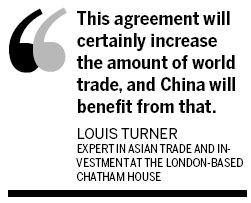US-EU talks mean challenges, chances
Updated: 2013-06-19 07:42
By Zhang Chunyan in London (China Daily)
|
||||||||
As the United States and the European Union prepare to begin talks in July on a free-trade deal, European experts noted that this would present China with challenges and opportunities.
US President Barack Obama, standing alongside EU leaders and British Prime Minister David Cameron, on Monday hailed the proposed trade agreement as a "potentially groundbreaking partnership" that would deepen ties between two areas that account for around 45 percent of the global economy.
The aim is to reach a comprehensive deal that would remove all tariffs and develop uniform rules and standards on a wide range of goods and services that would bolster trade, investment and jobs.
The first round of talks will be held in Washington during the week of July 8.
Some experts have expressed concern that the transatlantic trade agreement would influence China's trade relations with the EU and US as the agreement may mean a greater concentration of trade and investment between the US and Europe.
If a deal can be reached, it would create a free trade zone between the US and the 27 member states of the European Union.
China and the EU are each other's largest trading partners, and China and the US are each other's second-largest trading partners.
Some observers noted that the impact on China will not be in the short term. New trade rules and standards set by the EU and the US could be forced upon China and other countries in the future.
But Louis Turner, an expert in Asian trade and investment at the London-based Chatham House, said: "I think the free trade agreement will increase the potential for Chinese export markets, because American and European growth should be improved."

"This agreement will certainly increase the amount of world trade, and China will benefit from that," Turner added.
He noted that it's possible to strengthen the competitiveness of US and European companies, but Chinese companies are strong enough to stand up and face this competition.
EU Trade Spokesman John Clancy said: "I do not see trade as a zero-sum game: more trade with one country does not automatically mean less trade with another. Indeed, the benefits for the EU and the US coming from a transatlantic agreement would not be at the expense of the rest of the world."
Constanze Picking, senior adviser of the US Chamber of Commerce Europe Office, said: "The trading relationship between the EU and China is very different from the EU-US relationship.
"Most likely the trading relationship will not be influenced, particularly if China keeps its market open and looks favorably to the standards, norms and rules, which will be developed for the transatlantic market."
Analysts said the latest announcement was a victory for Cameron, who as host of this year's G8 summit made the launch of the talks a top priority.
Cameron and other European leaders are keen to energize a continent struggling with the eurozone debt crisis and longstanding structural economic problems.
But the trade agreement could take two years to hammer out. The US and Europe have very different standards, for example, in certifying the safety of autos, and even car bumpers.
European Council President Herman Van Rompuy also admitted there would be sensitivities on both sides, but the decision to hold the talks showed their political will to work together on growth, jobs and prosperity.
zhangchunyan@chinadaily.com.cn
(China Daily USA 06/19/2013 page14)

 Michelle lays roses at site along Berlin Wall
Michelle lays roses at site along Berlin Wall
 Historic space lecture in Tiangong-1 commences
Historic space lecture in Tiangong-1 commences
 'Sopranos' Star James Gandolfini dead at 51
'Sopranos' Star James Gandolfini dead at 51
 UN: Number of refugees hits 18-year high
UN: Number of refugees hits 18-year high
 Slide: Jet exercises from aircraft carrier
Slide: Jet exercises from aircraft carrier
 Talks establish fishery hotline
Talks establish fishery hotline
 Foreign buyers eye Chinese drones
Foreign buyers eye Chinese drones
 UN chief hails China's peacekeepers
UN chief hails China's peacekeepers
Most Viewed
Editor's Picks

|

|

|

|

|

|
Today's Top News
Shenzhou X astronaut gives lecture today
US told to reassess duties on Chinese paper
Chinese seek greater share of satellite market
Russia rejects Obama's nuke cut proposal
US immigration bill sees Senate breakthrough
Brazilian cities revoke fare hikes
Moody's warns on China's local govt debt
Air quality in major cities drops in May
US Weekly

|

|







